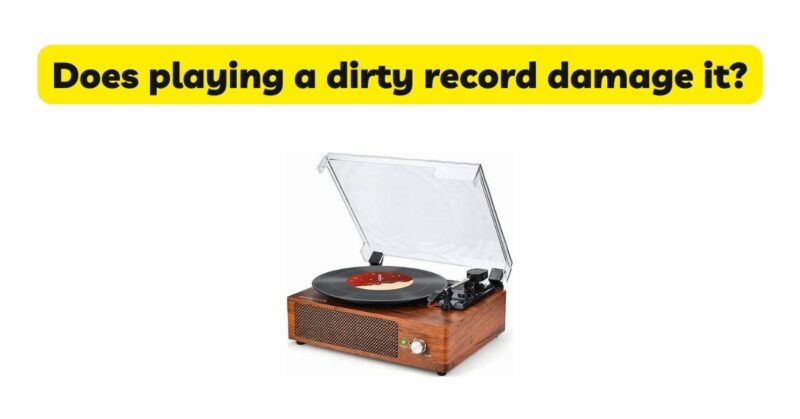Vinyl records have made a remarkable resurgence in recent years, captivating music enthusiasts with their warm sound and tactile experience. However, one question that often arises is whether playing a dirty record can cause damage. In this article, we will explore the effects of playing a dirty record, the potential risks involved, and the importance of clean playback. By understanding the impact of dirt and debris on vinyl records, we can make informed decisions to preserve the longevity and sound quality of our cherished collections.
The Effects of Dirt and Debris on Record Playback: Dirt, dust, and debris on a record’s surface can have various detrimental effects on playback quality. Here are some key effects to consider:
a. Sound Quality Degradation: When a stylus encounters dirt or debris on a record, it can cause audible pops, clicks, or crackles during playback. These disturbances interfere with the clarity and fidelity of the music, diminishing the overall listening experience.
b. Increased Surface Noise: The presence of dirt particles on a record’s surface can generate unwanted surface noise. This noise is particularly noticeable during quiet passages or between tracks, detracting from the intended dynamics and subtleties of the music.
c. Stylus Damage: Playing a dirty record can accelerate the wear and tear on the stylus. As the stylus moves across the grooves, it encounters abrasive particles that can cause the stylus tip to degrade more rapidly. This wear can lead to reduced tracking ability, compromised sound reproduction, and the need for more frequent stylus replacements.
d. Groove Damage: Fine particles of dirt or debris can get lodged in the record’s grooves, causing physical damage over time. When the stylus traverses these contaminated grooves, it can create additional scratches or widen existing ones, permanently affecting the record’s sound quality.
Risks Associated with Playing Dirty Records: Playing a dirty record not only compromises sound quality but also poses risks to both the record and the playback system. Consider the following risks:
a. Increased Stylus Pressure: When a stylus encounters dirt or debris, it can result in increased pressure on the record’s surface. This added pressure can cause the stylus to dig into the grooves, potentially leading to groove damage and accelerated wear on both the stylus and the record.
b. Tracking Issues: Dirt particles on a record can cause tracking issues, where the stylus struggles to maintain proper contact with the grooves. This can result in skips, jumps, or uneven playback, disrupting the flow of the music and potentially causing damage to the record and stylus.
c. Contamination Transfer: Playing a dirty record increases the risk of transferring dirt and debris to the turntable’s components. Dust and particles can accumulate on the turntable platter, tonearm, and cartridge, affecting their performance and potentially causing additional damage.
The Importance of Clean Playback: Maintaining clean records and practicing clean playback is crucial to preserve the longevity and sound quality of vinyl records. Consider the following reasons for prioritizing clean playback:
a. Sound Quality Preservation: Clean records provide a superior listening experience, allowing the music to shine without the interference of pops, clicks, and surface noise. By investing time in proper cleaning and maintenance, you can enjoy the full richness and detail of your vinyl collection.
b. Longevity of Records: Regular cleaning and clean playback practices help extend the life of your records. Removing dirt and debris prevents groove damage, reduces stylus wear, and minimizes the risk of irreversible scratches. By protecting the physical integrity of your records, you can continue to enjoy them for years to come.
c. Protection for the Playback System: Clean playback not only benefits the records but also safeguards the turntable and its components. By minimizing the transfer of contaminants, you can maintain the optimal performance of the turntable, cartridge, and stylus. This, in turn, ensures accurate tracking, reduces the risk of damage, and prolongs the lifespan of your playback system.
Best Practices for Clean Playback: To ensure clean playback and minimize the risks associated with dirty records, consider implementing the following best practices:
a. Record Cleaning: Prior to playback, clean your records using appropriate cleaning methods. This may include dry brushing with a carbon fiber brush to remove loose particles or wet cleaning with a record cleaning solution and a microfiber cloth to eliminate more stubborn dirt. Proper cleaning techniques can significantly improve sound quality and reduce the risk of damage.
b. Stylus Maintenance: Regularly clean and inspect your stylus to remove any accumulated dirt or debris. Use a stylus brush or a specialized cleaning solution to gently remove contaminants, ensuring optimal contact with the record grooves.
c. Clean Handling: Handle records with clean hands to minimize the transfer of oils, dirt, and sweat. Hold records by the edges or use record sleeves to avoid touching the playing surface.
d. Clean Storage: Store records in clean and dust-free environments, preferably in protective inner sleeves. Avoid stacking records horizontally without proper support, as this can lead to warping or physical damage.
e. Regular Maintenance: Maintain your turntable by cleaning the platter, tonearm, and cartridge regularly. Remove dust and debris from these components using appropriate cleaning tools to ensure accurate tracking and reduce the risk of contamination transfer.
Conclusion: Playing a dirty record can indeed cause damage to both the record itself and the playback system. The presence of dirt and debris on the record surface compromises sound quality, accelerates stylus wear, and increases the risk of groove damage. By prioritizing clean playback, including regular record cleaning, stylus maintenance, and proper handling and storage, you can minimize these risks and preserve the longevity and sound quality of your vinyl records. Embrace the joy of clean playback, and let your records provide you with countless hours of pristine musical enjoyment.


